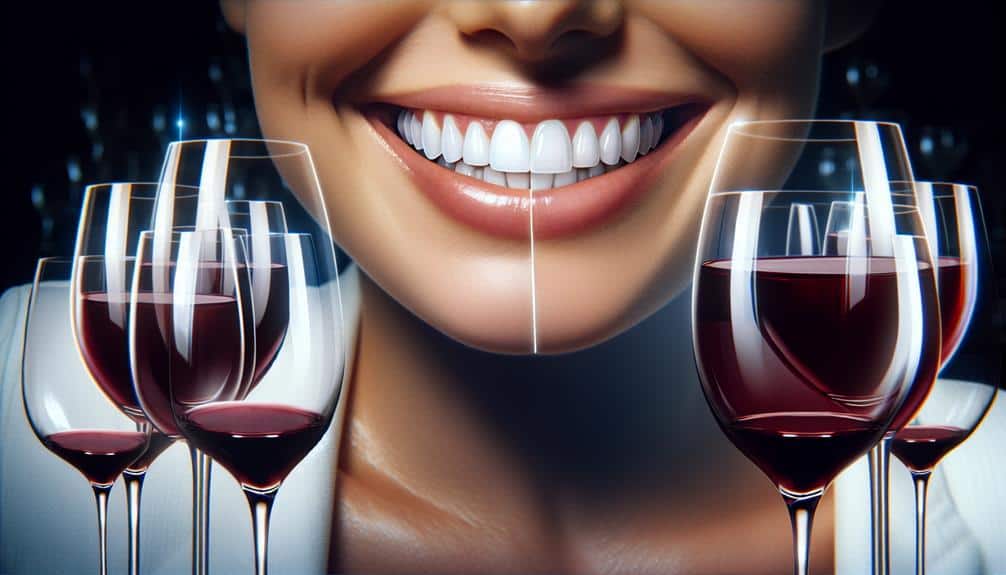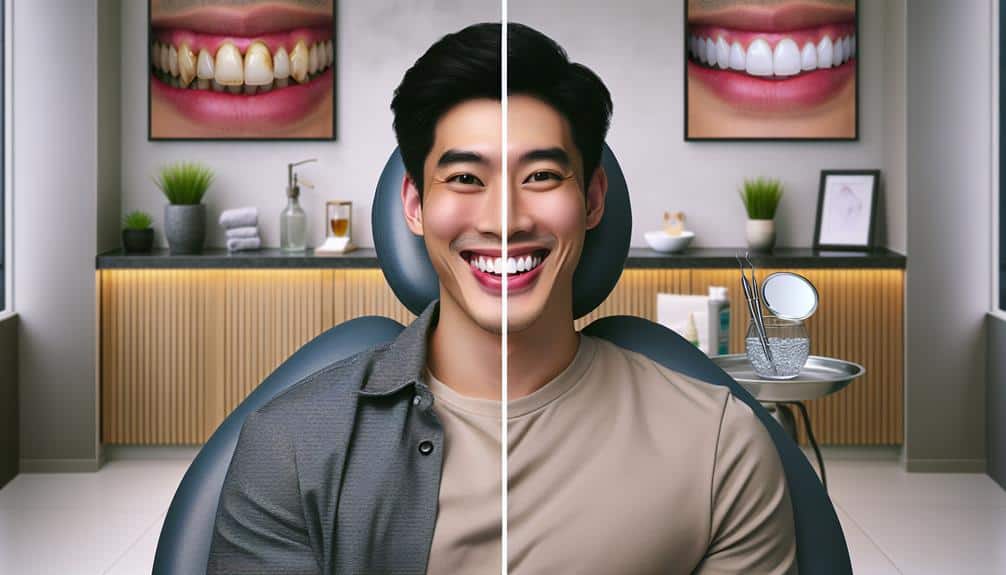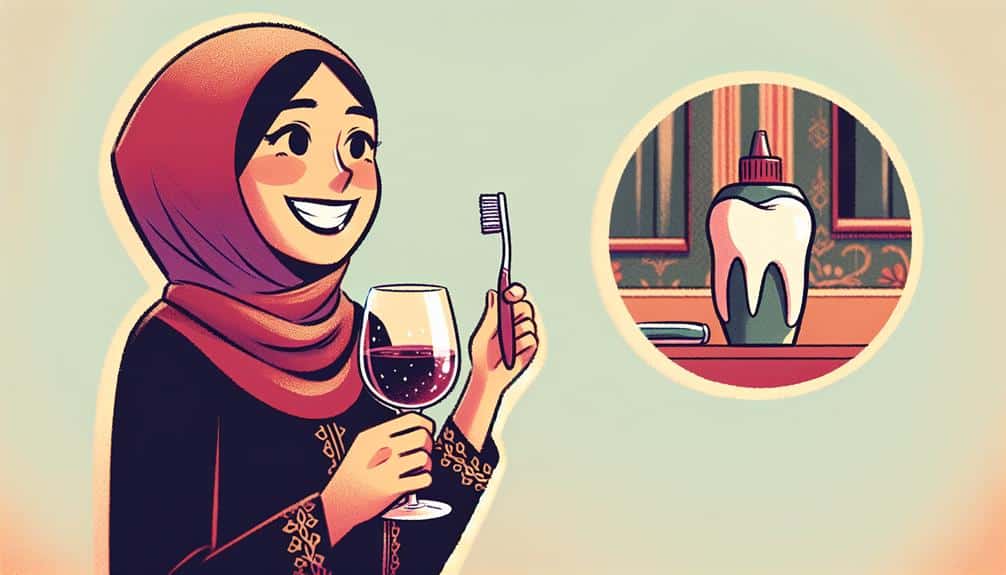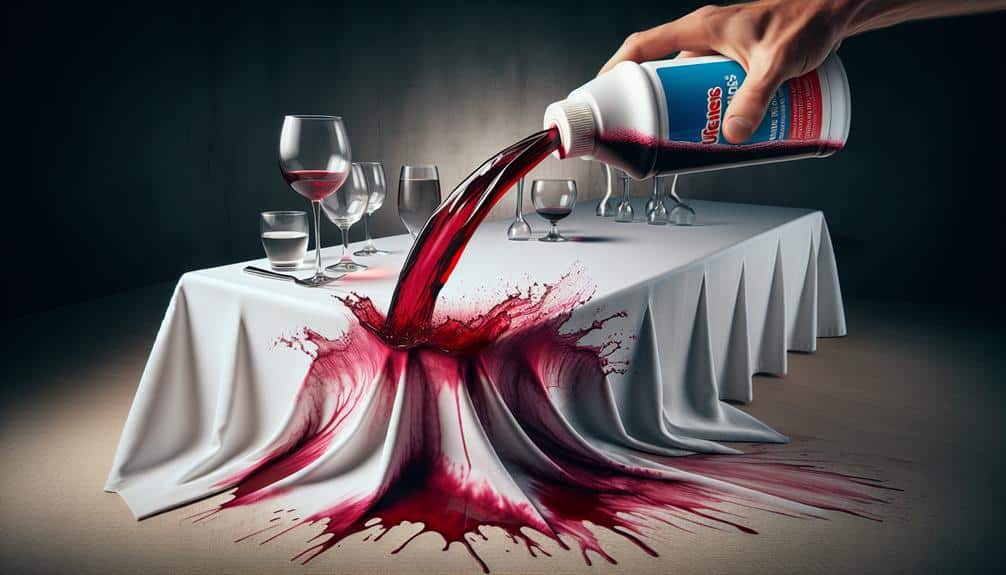Achieve swift results with professional dental whitening treatments like laser whitening. The bleaching agent, activated by laser light, is safe and efficient. DIY remedies using fruit enzymes, baking soda, and natural ingredients can help too. Whitening toothpaste and mouthwashes with hydrogen peroxide are effective for daily maintenance. Try professional whitening kits at home for personalized care. Prevent future stains by using stain-resistant products and making lifestyle changes. Enhance your smile by exploring these tailored solutions for red wine stains on teeth. Elevate your whitening game with these handy tips.
Key Points
- Professional dental whitening options offer swift solutions for red wine stains.
- DIY natural remedies like pineapple, papaya, and baking soda break down stains effectively.
- Whitening toothpaste and mouthwashes with hydrogen peroxide and silica target stains.
- Advanced whitening kits with personalized trays and potent bleaching gels provide noticeable results at home.
- Prevent future stains by using stain-resistant dental products and making lifestyle changes like using a straw.
Professional Dental Whitening Options
Considering professional dental whitening options is a reliable way to effectively combat red wine stains on your teeth. In-office treatments offer a swift and powerful solution to address stubborn stains caused by red wine consumption.
One popular method is laser whitening, a procedure where a bleaching agent is applied to your teeth, which is then activated by a laser to accelerate the whitening process. This technique can noticeably lighten the shade of your teeth in just one session, making it an attractive option for those seeking immediate results.
Laser whitening is a safe and efficient procedure that's typically performed by trained dental professionals. The process involves protecting your gums and applying a protective barrier to shield the soft tissues in your mouth from the bleaching agent. The laser helps to activate the whitening gel, allowing it to penetrate the enamel and break down stubborn stains effectively.
With the advancements in dental technology, laser whitening has become a sought-after treatment for combating red wine stains and achieving a brighter, whiter smile.
DIY Natural Remedies for Stains
To explore alternative approaches for addressing red wine stains on your teeth, consider trying out DIY natural remedies that can help diminish discoloration and promote a brighter smile. Fruit enzymes are a powerful natural solution for whitening teeth. Fruits like pineapple and papaya contain enzymes such as bromelain and papain, which can help break down stains on the teeth's surface. You can mash up these fruits and gently rub them on your teeth for a few minutes before brushing as usual.
Another effective natural remedy is baking soda. Baking soda has mild abrasive properties that can help scrub away surface stains on your teeth caused by red wine. Create a paste by mixing baking soda with a small amount of water and apply it to your teeth using a soft toothbrush. Gently brush for about two minutes before rinsing thoroughly. Remember not to use baking soda excessively as it can wear down tooth enamel over time.
Incorporating these DIY natural remedies into your oral care routine can aid in reducing red wine stains and brightening your smile.
Whitening Toothpaste and Mouthwashes
Whitening toothpaste and mouthwashes offer effective solutions for combating red wine stains on teeth and enhancing your smile's brightness. When it comes to brushing techniques, it's vital to use the proper amount of toothpaste and brush for at least two minutes to guarantee thorough coverage. Look for toothpaste with ingredients like hydrogen peroxide, baking soda, or silica, known for their stain-removing properties. These ingredients work by breaking down the molecules causing the stains, leading to a brighter smile over time. Mouthwashes containing hydrogen peroxide or cetylpyridinium chloride can also help in reducing stains and preventing further discoloration.
When selecting whitening products, consider the effectiveness of their ingredients in targeting stains. Hydrogen peroxide, for instance, is a common ingredient known for its whitening properties. Baking soda can act as a mild abrasive to scrub away surface stains gently. Silica helps to polish the teeth, removing stains and enhancing the overall brightness of your smile. By incorporating these ingredients into your oral care routine, you can effectively combat red wine stains and maintain a dazzling smile.
Professional Whitening Treatments at Home
For those looking for top-notch whitening results in the comfort of their own home, there are advanced whitening kits available that offer effective stain removal and brightening solutions. These kits typically consist of personalized trays and bleaching gels that are designed to replicate the results achieved at the dentist's office. Personalized trays guarantee that the bleaching gel covers the teeth evenly, providing consistent whitening results across all teeth surfaces.
The personalized trays are made to fit your teeth specifically, guaranteeing maximum contact between the bleaching gel and your teeth for ideal whitening. The bleaching gels used in these kits are formulated with potent whitening agents that can effectively remove stubborn stains caused by red wine consumption. By using these professional-grade kits at home, you can achieve noticeable results in a relatively short period.
When using these kits, following the instructions carefully is crucial to avoid any potential side effects such as tooth sensitivity. Consistency in usage is key to achieving the desired level of whitening while maintaining the health of your teeth.
Preventative Measures for Future Stains
To maintain the results achieved through professional whitening treatments at home, adopting preventative measures for future stains is key in preserving the brightness of your teeth over time. Consider using stain-resistant dental products such as toothpaste and mouthwash specifically formulated to combat discoloration caused by red wine and other staining agents. These products create a protective barrier on your teeth, making it harder for stains to adhere and penetrate the enamel.
In addition to using stain-resistant dental products, making lifestyle changes can also help prevent future stains. Avoiding or moderating the consumption of highly pigmented foods and beverages like red wine can significantly reduce the risk of staining. When indulging in these items, consider using a straw to minimize contact with your teeth. Also, maintaining good oral hygiene practices such as regular brushing and flossing can help remove surface stains before they become deeply embedded.
Frequently Asked Questions
Are There Any Specific Foods or Drinks That Should Be Avoided to Prevent Red Wine Stains on Teeth?
To prevent red wine stains on teeth, avoid dark-hued beverages and acidic foods. These preventive measures can help maintain a brighter smile. Remember, your dietary restrictions play an essential role in preserving your teeth's whiteness.
Can Red Wine Stains on Teeth Be Permanently Removed With Whitening Treatments?
You can explore various whitening treatments to reduce red wine stains on teeth. While some treatments offer temporary solutions, others can provide longer-lasting results by penetrating enamel for deeper discoloration removal. Consider alternatives for permanent improvements.
How Often Should Professional Whitening Treatments at Home Be Done to Maintain Results?
To maintain results, consider the frequency of your professional whitening treatments at home. Professional treatments are potent and typically last longer. Follow recommended intervals for maintenance. At-home treatments can be done more often but monitor for sensitivity.
Are There Any Long-Term Side Effects of Using Whitening Toothpaste and Mouthwashes?
Using whitening products like toothpaste and mouthwashes can lead to long-term effects such as increased tooth sensitivity or gum irritation. It is crucial to follow product instructions, not overuse, and consult your dentist if issues arise.
Is It Safe to Combine DIY Natural Remedies With Professional Whitening Treatments for Better Results?
You may wonder if mixing natural remedies with pro whitening is a bright idea. While DIY methods offer charm, pro treatments pack a power punch. Combining both can be a radiant combo for dazzling results!



